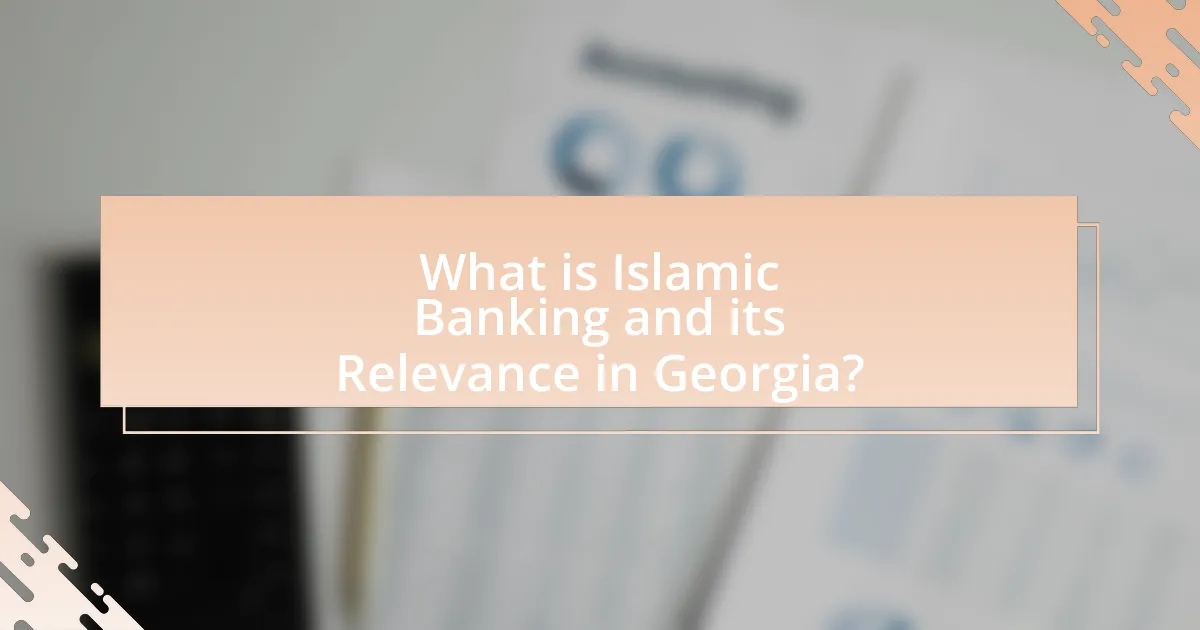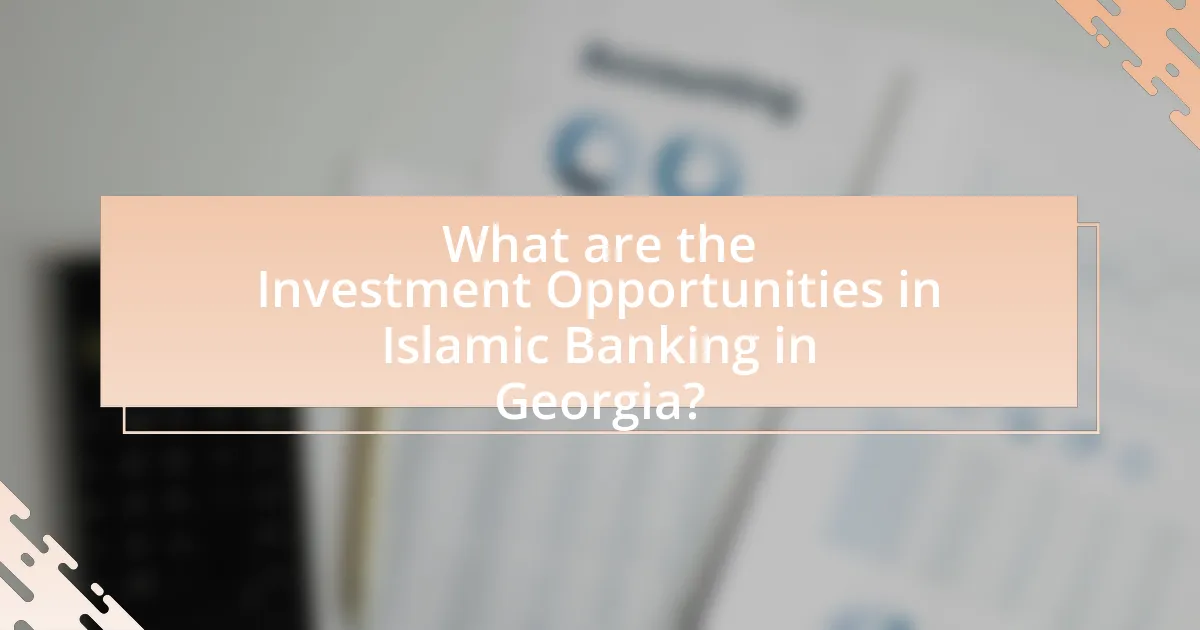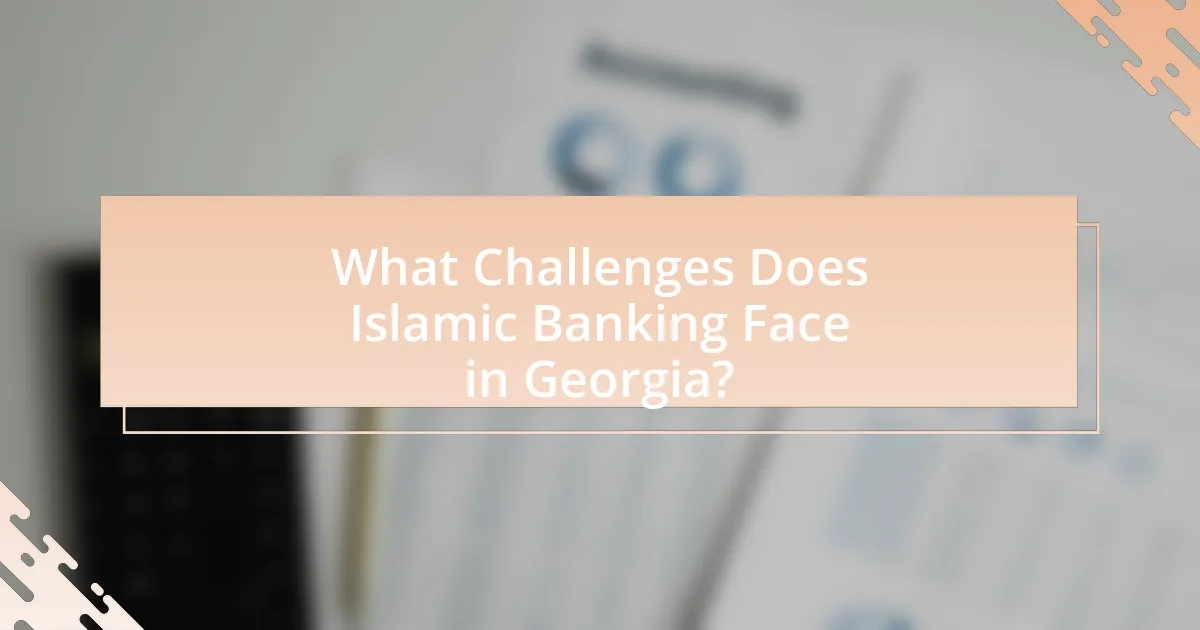Islamic banking, a financial system adhering to Sharia law, is gaining traction in Georgia due to its strategic location, a growing Muslim population, and increasing interest in Sharia-compliant financial products. The article explores the fundamental differences between Islamic and conventional banking, highlighting key principles such as the prohibition of interest and the emphasis on ethical investments. It discusses the investment opportunities within sectors like real estate, agriculture, and renewable energy, while also addressing the challenges faced by Islamic banking in Georgia, including regulatory hurdles and public awareness. The potential for growth in this sector is underscored by the Georgian government’s support and the demographic factors that contribute to the demand for Islamic financial solutions.

What is Islamic Banking and its Relevance in Georgia?
Islamic banking is a financial system that operates in accordance with Islamic law (Sharia), which prohibits interest (riba) and promotes risk-sharing, ethical investments, and asset-backed financing. In Georgia, Islamic banking is relevant due to the country’s strategic location, growing Muslim population, and increasing interest from investors seeking Sharia-compliant financial products. The Georgian government has expressed support for Islamic finance, recognizing its potential to attract foreign investment and diversify the financial sector. For instance, the establishment of Islamic banking institutions could facilitate investments in infrastructure and real estate, contributing to economic growth.
How does Islamic Banking differ from conventional banking?
Islamic banking differs from conventional banking primarily in its adherence to Sharia law, which prohibits interest (riba) and promotes risk-sharing. In Islamic banking, financial transactions must be based on tangible assets or services, ensuring that investments are ethical and socially responsible. For example, instead of earning interest on loans, Islamic banks engage in profit-sharing arrangements, such as Mudarabah and Musharakah, where both the lender and borrower share the risks and rewards of the investment. This fundamental difference aligns Islamic banking with ethical principles, contrasting with conventional banking’s profit-maximization approach through interest-based lending.
What are the key principles of Islamic Banking?
The key principles of Islamic Banking are the prohibition of interest (riba), risk-sharing, ethical investments, and adherence to Sharia law. Islamic Banking operates on the basis that money should not generate money without a corresponding risk or effort, which is why riba is forbidden. Instead, profit and loss sharing arrangements, such as mudarabah and musharakah, are utilized to align the interests of all parties involved. Additionally, investments must be made in socially responsible and ethical ventures, avoiding industries such as alcohol, gambling, and pork. These principles ensure that financial transactions are conducted in a manner that is fair, transparent, and compliant with Islamic teachings.
How does the prohibition of interest affect Islamic Banking operations?
The prohibition of interest, known as riba in Islamic finance, fundamentally shapes Islamic banking operations by necessitating the use of profit-sharing and risk-sharing models instead of interest-based lending. This prohibition leads Islamic banks to engage in transactions that comply with Sharia law, such as mudarabah (profit-sharing) and murabaha (cost-plus financing), which align with ethical investment principles. For instance, Islamic banks often invest in tangible assets or projects, ensuring that their financial activities contribute to real economic growth. This approach not only fosters financial inclusion but also mitigates risks associated with speculative investments, as evidenced by the resilience of Islamic banks during financial crises, where they often outperformed conventional banks due to their asset-backed financing structures.
Why is Islamic Banking gaining attention in Georgia?
Islamic Banking is gaining attention in Georgia due to its potential to attract foreign investment and diversify the financial sector. The country’s strategic location, coupled with a growing Muslim population and increasing interest in Sharia-compliant financial products, creates a favorable environment for Islamic finance. Additionally, the Georgian government has expressed support for developing Islamic banking, evidenced by initiatives to establish a regulatory framework that accommodates Islamic financial institutions. This combination of factors positions Georgia as an emerging hub for Islamic banking in the region, appealing to investors seeking ethical and compliant financial solutions.
What demographic factors contribute to the interest in Islamic Banking in Georgia?
The demographic factors contributing to the interest in Islamic Banking in Georgia include the presence of a significant Muslim population, which is approximately 10% of the total population, and the increasing awareness of Islamic finance principles among non-Muslims. The Muslim community, primarily concentrated in regions like Adjara and Kvemo Kartli, seeks banking solutions that align with their religious beliefs, fostering demand for Sharia-compliant financial products. Additionally, the growing interest in ethical and socially responsible investing among the broader population in Georgia has led to a heightened curiosity about Islamic Banking, which emphasizes risk-sharing and ethical investments. This demographic shift is supported by surveys indicating that a substantial portion of the population is open to alternative banking solutions, further validating the potential for Islamic Banking in the region.
How does Georgia’s geopolitical position influence Islamic Banking potential?
Georgia’s geopolitical position as a bridge between Europe and Asia enhances its Islamic Banking potential by attracting investments from both regions. The country’s strategic location facilitates trade and financial flows, making it an appealing hub for Islamic financial institutions seeking to enter new markets. Additionally, Georgia’s efforts to establish a favorable regulatory environment for Islamic finance, including the introduction of Sharia-compliant products, further support this potential. The presence of a diverse population, including a significant Muslim community, also creates a domestic market for Islamic banking services, reinforcing the viability of such financial systems in the region.

What are the Investment Opportunities in Islamic Banking in Georgia?
Investment opportunities in Islamic banking in Georgia include the development of Sharia-compliant financial products, real estate financing, and infrastructure projects. The growing Muslim population in Georgia, along with increasing interest in ethical finance, creates a demand for Islamic banking services. For instance, the Islamic Development Bank has shown interest in financing projects in the region, indicating a viable market for investment. Additionally, the Georgian government has expressed support for diversifying financial services, which aligns with the principles of Islamic finance, thus enhancing the potential for growth in this sector.
Which sectors are most promising for Islamic Banking investments?
The most promising sectors for Islamic Banking investments include real estate, agriculture, and renewable energy. Real estate offers opportunities for Sharia-compliant financing structures, such as Ijarah and Murabaha, which are increasingly popular in Georgia’s growing urban areas. Agriculture is vital due to Georgia’s rich agricultural resources, and Islamic finance can support sustainable farming practices through profit-sharing models. Renewable energy is gaining traction as global demand for sustainable solutions rises, and Islamic Banking can facilitate investments in solar and wind projects, aligning with ethical investment principles. These sectors are supported by Georgia’s strategic location and favorable investment climate, making them attractive for Islamic financial institutions.
How can real estate benefit from Islamic Banking principles?
Real estate can benefit from Islamic Banking principles through the promotion of ethical financing methods that align with Sharia law, such as profit-sharing and risk-sharing arrangements. These principles encourage investments in tangible assets, which can enhance the stability and growth of the real estate market. For instance, Islamic finance products like Murabaha (cost-plus financing) and Ijara (leasing) facilitate property acquisition without interest, making real estate investments more accessible and attractive to a broader range of investors. Additionally, the emphasis on ethical investments can lead to sustainable development in real estate projects, fostering community growth and economic stability.
What role does agriculture play in Islamic Banking investment strategies?
Agriculture plays a significant role in Islamic Banking investment strategies by aligning with Shariah principles that promote ethical and sustainable investments. Islamic banks often invest in agricultural projects to support food security, rural development, and economic growth, which are essential for the socio-economic stability of regions like Georgia. For instance, the Islamic Development Bank has funded agricultural initiatives that enhance productivity and sustainability, demonstrating the sector’s importance in Islamic finance. This focus on agriculture not only fulfills the ethical investment criteria of Islamic banking but also contributes to the overall development of the economy, making it a strategic area for investment.
What are the potential returns on investment in Islamic Banking?
The potential returns on investment in Islamic Banking can vary significantly, often ranging from 5% to 15% annually, depending on the specific investment vehicle and market conditions. Islamic Banking operates under principles that prohibit interest, focusing instead on profit-sharing and risk-sharing arrangements, which can lead to competitive returns. For instance, investments in Sukuk (Islamic bonds) have shown yields comparable to conventional bonds, with some Sukuk offering returns around 6% to 8%. Additionally, Islamic equity funds have historically provided returns that align with or exceed those of conventional equity funds, reflecting the growing demand for Sharia-compliant investments. This performance is supported by the increasing interest in ethical and socially responsible investing, which is a core tenet of Islamic finance.
How do risk-sharing mechanisms enhance investment returns?
Risk-sharing mechanisms enhance investment returns by distributing financial risks among multiple parties, thereby reducing the individual burden on investors. This collaborative approach allows for greater capital mobilization and encourages investment in projects that may otherwise be deemed too risky. For instance, in Islamic finance, profit-and-loss sharing contracts, such as Mudarabah and Musharakah, enable investors to share both profits and losses, aligning their interests and fostering a more sustainable investment environment. Studies have shown that such mechanisms can lead to higher overall returns, as they promote more prudent investment decisions and encourage innovation, ultimately benefiting all stakeholders involved.
What case studies illustrate successful Islamic Banking investments in Georgia?
Successful Islamic Banking investments in Georgia can be illustrated by the case of Bank of Georgia, which launched Islamic banking products in 2016, catering to the growing Muslim population and attracting investments. Additionally, the partnership between TBC Bank and Dubai Islamic Bank in 2019 facilitated the introduction of Sharia-compliant financing options, enhancing the appeal of Islamic finance in the region. These initiatives have led to increased financial inclusion and diversification of the banking sector in Georgia, demonstrating the viability and success of Islamic banking investments.

What Challenges Does Islamic Banking Face in Georgia?
Islamic banking in Georgia faces several challenges, primarily regulatory hurdles, lack of awareness, and limited financial infrastructure. The regulatory framework in Georgia does not fully accommodate Islamic banking principles, which complicates the establishment and operation of Sharia-compliant financial institutions. Additionally, there is a general lack of awareness among the population regarding Islamic banking products and their benefits, which hinders customer adoption. Furthermore, the existing financial infrastructure is not adequately equipped to support the unique requirements of Islamic finance, such as profit-sharing mechanisms and risk-sharing contracts. These challenges collectively impede the growth and potential of Islamic banking in Georgia.
What regulatory hurdles exist for Islamic Banking in Georgia?
Islamic banking in Georgia faces several regulatory hurdles, primarily due to the lack of a comprehensive legal framework that accommodates Sharia-compliant financial products. The absence of specific regulations governing Islamic finance creates uncertainty for financial institutions wishing to operate under Islamic principles. Additionally, existing banking laws do not recognize profit-sharing models, which are fundamental to Islamic banking, leading to challenges in product development and implementation. Furthermore, the Central Bank of Georgia has not yet issued guidelines or licenses specifically for Islamic banks, which restricts their ability to operate effectively within the financial system. These regulatory gaps hinder the growth and acceptance of Islamic banking in Georgia, limiting investment opportunities in this sector.
How can policymakers support the growth of Islamic Banking?
Policymakers can support the growth of Islamic Banking by establishing a regulatory framework that aligns with Sharia-compliant financial principles. This framework should include clear guidelines for Islamic financial products, ensuring they meet the requirements of both local and international standards. For instance, the introduction of tax incentives for Islamic financial institutions can stimulate investment and attract customers, as evidenced by countries like Malaysia, where such measures have significantly boosted the Islamic finance sector. Additionally, policymakers should promote financial literacy regarding Islamic banking among the public, which can enhance consumer confidence and participation. By fostering an environment conducive to Islamic finance, including collaboration with international Islamic financial institutions, policymakers can effectively drive the growth of Islamic Banking in Georgia.
What are the challenges in educating the public about Islamic Banking?
The challenges in educating the public about Islamic Banking include misconceptions about its principles, lack of awareness regarding its benefits, and limited access to educational resources. Misconceptions often stem from a general misunderstanding of Sharia law, leading to the belief that Islamic Banking is inherently risky or incompatible with conventional finance. Additionally, many individuals are unaware of the ethical and profit-sharing aspects that differentiate Islamic Banking from traditional banking systems. Limited access to educational resources, such as workshops or literature, further hampers public understanding, particularly in regions like Georgia where Islamic Banking is still emerging. These factors collectively contribute to the difficulty in effectively communicating the advantages and operational mechanisms of Islamic Banking to the broader public.
How can Islamic Banking institutions overcome these challenges?
Islamic banking institutions can overcome challenges by enhancing regulatory frameworks and increasing public awareness. Strengthening regulations ensures compliance with Sharia principles while fostering trust among stakeholders. For instance, the Central Bank of Georgia can develop specific guidelines for Islamic finance, which would facilitate smoother operations. Additionally, educational initiatives aimed at both consumers and financial professionals can demystify Islamic banking products, leading to greater acceptance and participation. Research indicates that countries with robust regulatory frameworks and public education on Islamic finance experience higher growth rates in this sector, exemplified by Malaysia’s success in Islamic banking expansion.
What strategies can be implemented to build trust in Islamic Banking?
To build trust in Islamic Banking, financial institutions should implement transparency, community engagement, and adherence to Sharia principles. Transparency involves clear communication about financial products, fees, and profit-sharing mechanisms, which can enhance customer understanding and confidence. Community engagement can be fostered through educational programs that inform potential clients about Islamic finance principles and practices, thereby demystifying the banking process. Adherence to Sharia principles is crucial, as it ensures that all banking activities are compliant with Islamic law, which can reassure customers of the ethical nature of their financial dealings. Research indicates that banks that prioritize these strategies experience higher customer satisfaction and loyalty, as evidenced by a study published in the Journal of Islamic Accounting and Business Research, which found that transparency and ethical practices significantly influence customer trust in Islamic financial institutions.
How can partnerships with local businesses enhance Islamic Banking’s presence?
Partnerships with local businesses can significantly enhance Islamic Banking’s presence by fostering community trust and expanding customer reach. When Islamic banks collaborate with local enterprises, they can tailor financial products that meet the specific needs of the community, thereby increasing customer engagement. For instance, local businesses can serve as distribution channels for Islamic banking services, facilitating access to a broader customer base. Additionally, these partnerships can promote awareness of Islamic banking principles, such as profit-sharing and ethical financing, which resonate with local values. Evidence from various markets shows that banks that engage with local businesses often see a rise in customer loyalty and market share, as they become more integrated into the community fabric.
What best practices should investors consider when exploring Islamic Banking opportunities in Georgia?
Investors exploring Islamic Banking opportunities in Georgia should prioritize understanding Sharia-compliant financial principles. Familiarity with these principles ensures that investments align with Islamic law, which prohibits interest and promotes ethical investing. Additionally, investors should conduct thorough due diligence on local Islamic financial institutions, assessing their compliance with Sharia standards and their financial health. Engaging with local experts and legal advisors knowledgeable in Islamic finance can provide valuable insights into the regulatory landscape and market dynamics. Furthermore, investors should consider the growing demand for Islamic financial products in Georgia, as the country has been actively promoting Islamic banking since 2016, evidenced by the establishment of the first Islamic bank in the region. This context highlights the potential for growth and profitability in this sector.